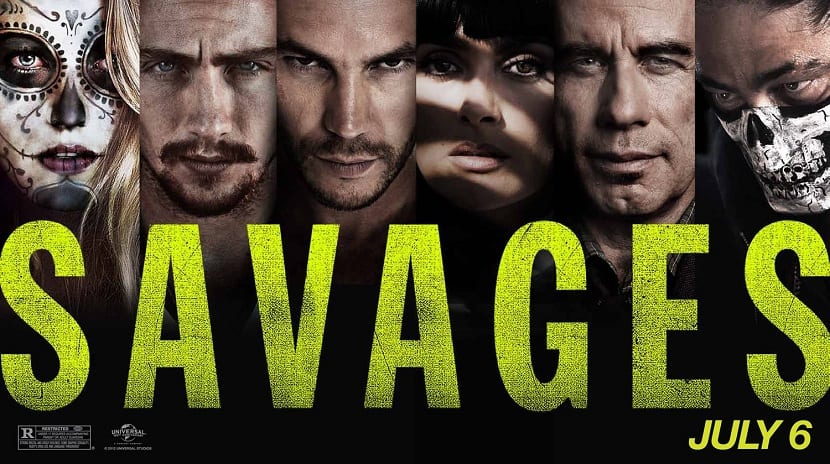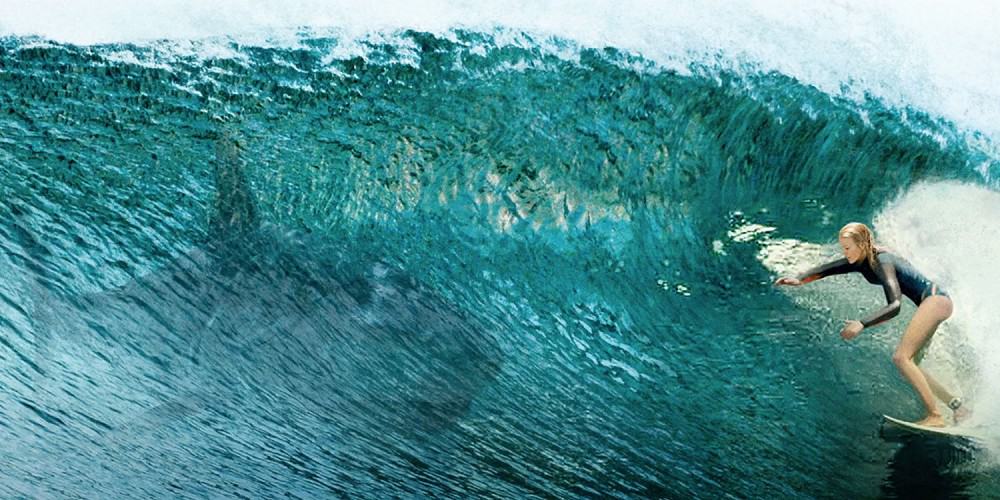
Movie Review: ‘SAVAGES’
Oliver Stone has balanced his career over the years between political and edgy films that are often quite unbalanced in and of themselves. When he isn’t attempting to capture the complexities of the presidential life (Nixon, JFK, W.) you might see him documenting the crazy and dark side of man (Platoon, Natural Born Killers, U-Turn). After a string of political films dealing with wealth and power, Savages finds the director returning to the world of sex, drugs, and violence in an acid-trip style that some will recognize all too easily.
Beginning with handheld, found-footage of men being prepared for a slaughter, Stone gives the audience a sobering slap to the face as a warning of the horrors to come. In doing so he utilizes a popular film technique found in modern horror. High times are not necessarily ahead. Chon (Taylor Kitsch) and Ben (Aaron Johnson) are two of the most successful pot dealers in California who also happen to have the most potent weed in the world. The differing personalities of the two guys – one is more aggressive due to his military past while the other is compared more to Bono for his desire to use his success to help the unfortunate – are united together through O (Blake Lively). When the young entrepreneurs reject the Baja Mexican drug cartel’s business proposition, O is kidnapped and held hostage by their leader Elena (Salma Hayek). Her disappearance triggers a series of events that involves a federal agent (John Travolta), a sadistic drug enforcer (Benicio Del Toro), and our two leads discovering what it really means to be savages.
Fans of the once considered “controversial” director will take pleasure in seeing him return to the overly-stylized visuals that lit up the screen in Natural Born Killers and U-Turn. Consisting of a color palette that would make Tony Scott’s heart melt (which makes sense since it features the same cinematographer as Domino), Savages ignites the screen with saturated shades of greens and yellows with the occasional pop of red and purple. It’s without a doubt a beautiful film to watch even if it’s reminiscent of what we have come to expect from Stone’s more violent fare. Thanks to the extraordinary work by KNB EFX, every gunshot and eye gouge (yes, I said eye gouge) feels painful and authentic. Not since Stone’s 2004 entertaining disaster Alexander have we seen the director been this plentiful with the gore. Though much like that troubled film, Savages also suffers from two very similar issues that drags it down: miscasting and poor editing. Most of the cast does an adequate job with a script that doesn’t have as much of a kick as the weed the characters seem to be smoking. Aaron Johnson (Kick-Ass) effortlessly steals the film as a drug-dealer with a passion for . . . well . . . more than just sitting around his sea-side bachelor pad smoking weed all day. Taylor Kitsch looks to be acting his way through using his cheekbones and intense stares. In a weird way it somehow works. I can’t say the same for Salma Hayek and John Travolta. Neither of the two veteran actors makes a serious impression and both produce some unintentional humor. Travolta, in particular, comes across a little too zany for a federal agent. While Hayek fails miserably at trying to be threatening; even when she’s delivering a speech exclaiming that she will kill the wives, children, and mothers of her incompetent hit men.
Editing seems to be an issue that Oliver Stone has dealt with during his career. Take for example Alexander. Not only was there a theatrical cut of the film but also a “Director’s Cut” and a later “Final Cut” released just two years after the initial DVD. Savages finds the director maintaining a healthy balance on the story for the better half of the film. It isn’t until the last half where the two young pot dealers seem to take a sudden back seat to the action and the focus is placed mainly on Bencio Del Toro and Salma Hayek. The camaraderie that was initially explored between the two is replaced with which villains are double-crossing who and why. A failed attempt to re-kindle the “bromance” is attempted right before the finale where Ben half-heartedly spills his feelings for his friend. What could have been a tender moment is completely dismissed by the score kicking in with a tune reminiscent of Ennio Morricone at the end of a “spaghetti-western.” The Spanish horns signal the arrival of a large-scale final shootout that may not end the way you think. Stone delivers a finale that strives to be clever but is actually maddeningly frustrating.
None of the aforementioned problems are more obvious though than the weak script. I can’t compare it to the book since I haven’t read the novel by Don Winslow. All that I can say is that Winslow had a hand in the screenplay and so I can’t help but feel it has his approval. Winslow, Stone, and fellow screenwriter Shane Salerno attempt to infuse the hard-hitting action with snippets of dark humor. However, you cannot equate such overreaching quips – “He had sex to try to forget the pain of Afghanistan. I had orgasms, he had wargasms.” – as fun and snappy dialogue. There are several moments such as this one that feels forced and as if they were trying to sound too contemporary. Unfortunately this horrendous line and some of the others come from a completely unnecessary voice-over by Blake Lively. Her mental ramblings almost take away from a solid start that Oliver Stone gives the film. Even if you can somehow tune out her beach-dream internal dialogue, the rest of the script doesn’t really bring to life the characters as much as Stone and his cinematographer’s camera do. Del Toro is left twisting his mustache and hiding behind an Elvis pompadour and sunglasses for the majority of the film since the script fails to give him any meat to chew on. When him and Travolta are finally given a dramatic scene in a kitchen later in the film, the two of them almost seem to bust-out laughing at the ridiculousness of it all. Salma Hayek seems to mirror this same frustration earlier in the film when she collapses to the floor and pulls her wig off in what could be reminiscent of her true feelings about the character she is playing.
Like some of the director’s more treasured and violent films of the past, Savages delivers the goods. His overt attention to the visuals is the redeeming element that makes this film worth a watch for fans of the director. Those who haven’t seen Oliver Stone switch between color and black & white photography in the same shot or who haven’t seen his kaleidoscope of colors which is all the more dizzying by the twirling camera movements, may be more impressed than some by the energetic, visual flair on display here. As much as I often found myself completely immersed in the rich imagery on display, I was just as easily shook from my high by the sobering effect of the weak dialogue. Comedowns suck bro. Let’s just light-up another and look at the pretty colors.



New Age Bookkeeping app for India
Muchos Gracias for your article post.Thanks Again. Want more.